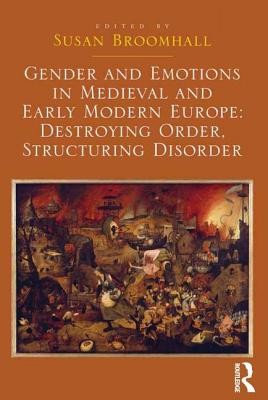
- We will send in 10–14 business days.
- Author: Susan Broomhall
- Publisher: Routledge
- ISBN-10: 1472453271
- ISBN-13: 9781472453273
- Format: 15.6 x 23.4 x 1.8 cm, hardcover
- Language: English
- SAVE -10% with code: EXTRA
Gender and Emotions in Medieval and Early Modern Europe: Destroying Order, Structuring Disorder (e-book) (used book) | bookbook.eu
Reviews
Description
States of emotion were vital as a foundation to society in the premodern period, employed as a force of order to structure diplomatic transactions, shape dynastic and familial relationships, and align religious beliefs, practices and communities. At the same time, societies understood that affective states had the potential to destroy order, creating undesirable disorder and instability that had both individual and communal consequences. These had to be actively managed, through social mechanisms such as children's education, acculturation, and training, and also through religious, intellectual, and textual practices that were both socio-cultural and individual. Presenting the latest research from an international team of scholars, this volume argues that the ways in which emotions created states of order and disorder in medieval and early modern Europe were deeply informed by contemporary gender ideologies. Together, the essays reveal the critical roles that gender ideologies and lived, structured, and desired emotional states played in producing both stability and instability.
EXTRA 10 % discount with code: EXTRA
The promotion ends in 19d.19:00:54
The discount code is valid when purchasing from 10 €. Discounts do not stack.
- Author: Susan Broomhall
- Publisher: Routledge
- ISBN-10: 1472453271
- ISBN-13: 9781472453273
- Format: 15.6 x 23.4 x 1.8 cm, hardcover
- Language: English English
States of emotion were vital as a foundation to society in the premodern period, employed as a force of order to structure diplomatic transactions, shape dynastic and familial relationships, and align religious beliefs, practices and communities. At the same time, societies understood that affective states had the potential to destroy order, creating undesirable disorder and instability that had both individual and communal consequences. These had to be actively managed, through social mechanisms such as children's education, acculturation, and training, and also through religious, intellectual, and textual practices that were both socio-cultural and individual. Presenting the latest research from an international team of scholars, this volume argues that the ways in which emotions created states of order and disorder in medieval and early modern Europe were deeply informed by contemporary gender ideologies. Together, the essays reveal the critical roles that gender ideologies and lived, structured, and desired emotional states played in producing both stability and instability.


Reviews